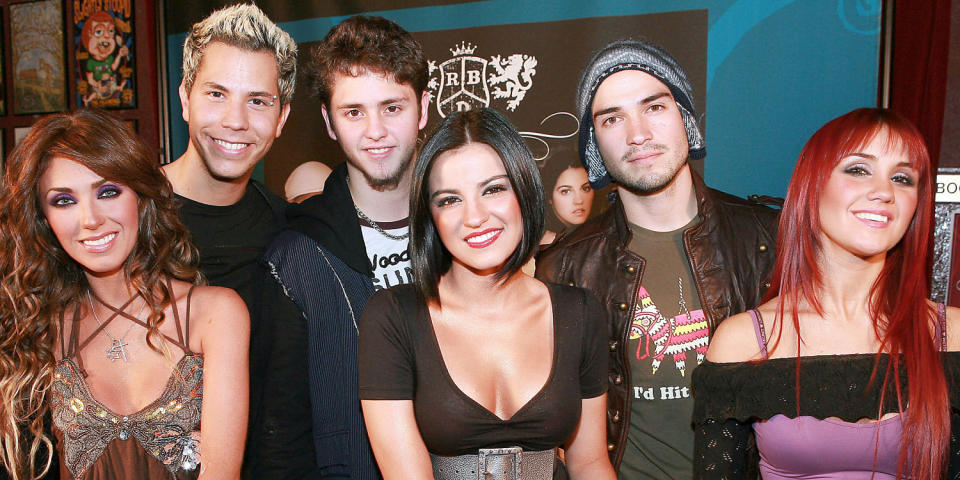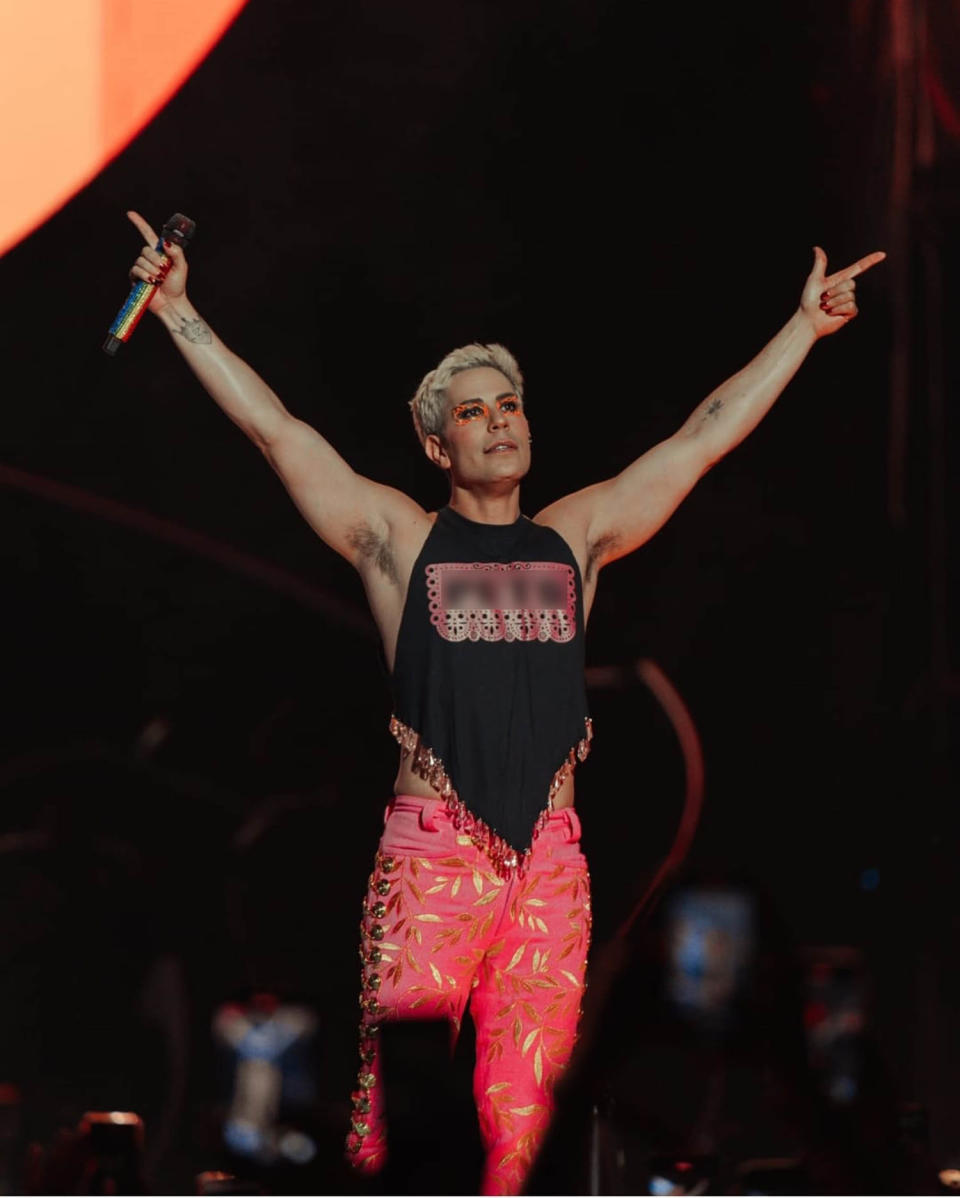Christian Chávez reveals the moment he decided to 'go full-on more queer'
Christian Chávez is a singer, actor, activist and champion of LGBTQ+ rights. Throughout his rise to fame in the Mexican telenovela "Rebelde," which aired from 2004 to 2006, and its corresponding pop group RBD, the artist found his life filled with highs and lows. After struggling with his sexuality and being blackmailed to come out during the height of RBD's success in 2007, Chávez entered a dark period of his life. Two years later, RBD disbanded after deciding not to renew their contracts and focus on their separate projects.
It wasn't until 2020 that Chavez says he finally began his journey toward healing, starting with playing characters like “Casa de Las Flores”'s Patricio, and Matías, an assistant who fights against gay stereotypes in "La Suerte de Loli."
After RBD's discography was finally released on streaming platforms in 2020, eventually, fans' fervor led the band to announce their official reunion tour after almost 15 years apart. With RBD's comeback, Chávez set out to embrace his true self and work to advocate against LGBTQ+ violence and substance abuse.
In this exclusive essay — as told to TODAY.com's Liz Calvario — Chávez opens up about how the "Soy Rebelde Tour" changed his life. He also reveals that he will be releasing a memoir next year.
In 2007 — about 17 years ago — I was outed by a website called Latin Gossip.
I got married when I was 19 years old. It was a very discreet wedding; just me, my fiancé at the time, his best friend, and a judge. Somehow, three years later, somebody got a hold of pictures of the wedding. To this day, I still don’t really know the real facts, just that the photos were stolen and used to blackmail Televisa, the network that aired the telenovelas I starred in, including “Rebelde.” And, of course, they tried to blackmail me.
A producer gave me the option of what I wanted to do. He could release a statement saying that those pictures were fake, or he would support me in whatever decision I made. I explained to him that when I was about 16 or 17, I asked God to change me because I grew up in a Catholic family. But the change never happened, and I suffered every night. I would have liked someone to be there for me.
Eventually, faced with this blackmail, I decided to come out in a letter that I posted on RBD's website. It was really hard. I was only 23, and I didn’t have anyone to look up to for guidance on how to handle it all. In Mexico, I became the first Latin artist to talk honestly about my sexuality; at that time, not even Ricky Martin was out.
After I came out publicly, the network explained to me that they couldn’t move forward with the plans we had for my next project because they felt no one would now believe I was a straight guy on a telenovela...or any series. Nearly two years after, RBD broke up. With no more RBD and no further projects as an option with Televisa, I was unemployed, on top of the overwhelming criticism and hatred I was receiving from people about my sexuality.
Suddenly, I was both jobless and depressed. I hated myself. I blamed myself, because while I had fought for my freedom and decided to come out, in the end, I lost everything.

My family knew about my sexuality, because I had talked to them about it when I was 17. But one thing is talking to your family, and another is telling the whole world. And because I was forced to come out, I was not ready when I did. That affected me psychologically in many ways that I didn't know at the time. I got into a really disruptive mode: Drugs. Toxic relationships. I was in a bad, bad place.
When I was outed, many people — producers, friends, even my own father — used to tell me: “Now you have to be a very masculine guy. Nobody can see any feminine part of you, because they’re not going to accept you or hire you for anything.” It was like coming out of a closet and then getting into another one. I was out, but I was not really being myself. And that really hurt my soul.
After nearly a decade of struggling and self-hated, RBD started to discuss reuniting. Then, this past August, I turned 40. It felt like an opportunities for a new beginning. Unexpectedly, with both a new chapter and a new decade of my life came a beautiful renaissance.
In 2020, I had the opportunity to play "Pato" in the series "La Casa de Las Flores." That was a character that really touched my soul and made me learn a lot of things about myself. But I think it was only one step in my growth.
When we started discussing the RBD reunion, I talked to myself and I said: “OK, if you are going to do this again, you’re going to be yourself. You’re gonna show your true self.”
I remember when I was a little kid and used to go with my mom and my sister to department stores, I’d look at certain things that were supposed to be “for girls.” There were certain things that I wanted to buy or that I wanted to wear, like pink or purple, and they would tell me, “No, that’s not for boys.”
But with this tour, I continued experimenting with wearing things like non-binary clothing. It was just one of many actions that felt like taking little Christian's hand and saying, “Hey, come with me. Let’s play. What do you want to wear? What do you want to say? What do you want to do?” The entire tour was like I was parenting myself. It was so therapeutic — and healing.
The strongest part was when I decided that on the tour, I wanted to sing a mariachi version of our song “Tu Amor,” because I wanted to do something very Mexican. And the wardrobe team asked, “What do you want to wear on stage for that?” I told them I wanted to wear a charro, the traditional outfit of Mexican rancheros, often worn by mariachi singers. They asked me what color and I replied: “Pink! Neon pink! Mexican pink! And I want to have leaves growing from each part of the suit!”
When I came out in the suit, I received very beautiful reactions — but also very harsh criticism on social media. In Mexico, Luisa Echeverría, the queen of the Mexican Federation of Charrería, and all of these machos guys were commenting saying that I was disrespecting charros and mocking the national sport. Somehow, I ended up apologizing on social media to anyone I offended, even though I didn't really feel I had anything to apologize for. But ultimately, I just always wanted everyone to love me.
I used to try so hard. I was more masculine. I was more like this, more like that. And then I understood that pleasing everyone was never going to happen. Or, as we say in Spanish, “No soy una monedita de oro para caerle bien a todos."
After the criticism I received from wearing the charro suit, something exploded inside of me. It was like, OK, now I’m gonna do this, and I’m going to go all the way. Now I’m going to sing “Tu Amor” not just in the charro suit, but with makeup on, because I used to take off my makeup to do that song. But now I’m going to go full-on more queer with what I want to do on stage and also with what I say during the concerts.
After the pink charro suit, I was always excited. I was always pushing boundaries. I wanted the conversation it started; I liked it. Regardless of what people said, the outfits made me feel — first of all, gorgeous — and second, very proud of myself. I was like, “Hey, this is me. So like it or hate it. But this is me.”
During the “Soy Rebelde” shows, I never prepared any of my speeches. I just tried to say what I was feeling at the moment. On the last concert of the tour, I decided to own the words that put me down, that hurt me, that were hard for me to listen to, especially the Spanish slurs that some people use to refer to gay people. Under my charro suit, I wore a shirt with one of those words on it. A lot of people had suffered because of that word, and for a lot of people, it was the last thing they heard when they got killed. I decided I wanted to own that word so that others could not hurt me anymore. And I wanted others to do the same thing.

For me, it’s literally like I’m a butterfly. I was a caterpillar when I started this — and now, I’m a beautiful butterfly.
The pink charro suit really lit my flame. It’s wonderful hearing about people finding their identity reflected in the things that I do, especially my wardrobe. I never planned it. I just did it because I wanted to be me. I wanted to have fun, and I wanted to be myself.
Now, I have plans. I want to do a clothing line for girls and boys and non-binary people. I want to work with my stylist from the tour because he understood my ideas, and we created all the looks together. Now, we want to make them for other people to have.
There’s a Christian before and after the “Soy Rebelde Tour,” and I’m so happy about that. I do attend actual therapy, but for four-and-a-half months, that tour was also like therapy, every night. There’s still a lot of work to do in me, but I feel like finally, I’m comfortable in my skin.
I'm excited to share that I've also been working on a memoir with Rolling Stone magazine writer Tomás Mier. That's something that really excites me, because now people are going to learn more about everything that has happened to me since I was a kid. Publishing this book is not only about telling my story; it's also giving people the opportunity to understand things that, back when they happened in real time, they might not have.
But it's also for me. This book, it will be part of my healing.
I realized that there are certain things that, because they hurt so much, I had blocked out. When I was working on the book, I was like, “Oh my God. I didn’t remember this.” It was hurtful, but it’s part of the therapy, too.
And yes, I still have more plans. I also want to open a nonprofit, which I hope will focus on helping la tercera edad (seniors) in the LGBTQ+ community. There are a lot of trans women and trans men that are older, and nobody's taking care of them. We have to respect them, help them, and remember that because of them, we are who we are right now. It's very important to cherish their lives by taking care of them in the right way. I also want to produce content for the LGBTQ+ community.
There are many, many things I want to do. But now that the tour is over...first, it's time for a month-long vacation.
The “Soy Rebelde” tour kicked off on Aug. 25 and wrapped Dec. 21 at the Estadio Azteca in Mexico City. Chávez's memoir will be released in 2024.
This essay has been edited and condensed for clarity.
This article was originally published on TODAY.com

